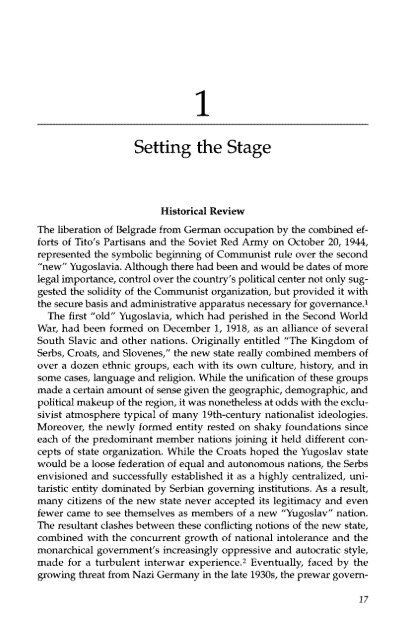- Page 2 and 3: Power and Persuasion
- Page 4 and 5: Power and Persuasion Ideology and R
- Page 6 and 7: Contents Acronyms Acknowledgements
- Page 8 and 9: Acronyms The following abbreviation
- Page 10 and 11: Acronyms PWC PYY RKSSRNH SAWPY SKJ
- Page 12 and 13: Acknowledgements As I sat down to w
- Page 14 and 15: Introduction When the Communist Par
- Page 16 and 17: Introduction 3 political and ideolo
- Page 18 and 19: Introduction 5 Reference to that st
- Page 20 and 21: Introduction 7 cialism. Party leade
- Page 22 and 23: Introduction 9 eventually its entir
- Page 24 and 25: Introduction 11 pending on a number
- Page 26 and 27: Introduction 13 ganda was primarily
- Page 28 and 29: Part One While this monograph offer
- Page 32 and 33: Setting the Stage 19 As the war pro
- Page 34 and 35: Setting the Stage 21 law on agraria
- Page 36 and 37: Setting the Stage 23 form of party
- Page 38 and 39: Setting the Stage 25 the country al
- Page 40 and 41: Setting the Stage 27 As a result of
- Page 42 and 43: Setting the Stage 29 the party's di
- Page 44 and 45: Setting the Stage 31 emotional inte
- Page 46 and 47: Setting the Stage 33 12. Dennison R
- Page 48 and 49: 2 Tools of the Trade: The Apparatus
- Page 50 and 51: Tools of the Trade: Tlte Apparatus
- Page 52 and 53: Tools of the Trade: Tlte Apparatus
- Page 54 and 55: Tools of the Trade: Tlte Apparatus
- Page 56 and 57: Tools of the Trade: Tlte Apparatus
- Page 58 and 59: Tools of the Trade: The Apparatus f
- Page 60 and 61: Tools of the Trade: Tlte Apparatus
- Page 62 and 63: Tools of the Trade: Tlte Apparatus
- Page 64 and 65: Tools of the Trade: The Apparatus f
- Page 66 and 67: Tools of the Trade: Tlte Apparatus
- Page 68 and 69: Tools of the Trade: Tlte Apparatus
- Page 70 and 71: Tools of the Trade: The Apparatus f
- Page 72 and 73: Tools of the Trade: Tlte Apparatus
- Page 74 and 75: 3 Problems of Persuasion The party,
- Page 76 and 77: Problems of Persuasion 63 gaged in
- Page 78 and 79: Problems of Persuasion 65 Finally,
- Page 80 and 81:
Problems of Persuasion 67 mal. Many
- Page 82 and 83:
Problems of Persuasion 69 Hercegovi
- Page 84 and 85:
Problems of Persuasion 71 more lite
- Page 86 and 87:
Problems of Persuasion 73 SSOJ-37;
- Page 88 and 89:
Part Two Having described the histo
- Page 90 and 91:
4 Taking Power: Cultural Manipulati
- Page 92 and 93:
Taking Power: Cultural Manipulation
- Page 94 and 95:
Taking Power: Cultural Manipulation
- Page 96 and 97:
Taking Power: Cultural Manipulation
- Page 98 and 99:
Taking Power: Cultural Manipulation
- Page 100 and 101:
Taking Power: Cultural Manipulation
- Page 102 and 103:
lating Power: Cultural Manipulation
- Page 104 and 105:
Taking Power: Cultural Manipulation
- Page 106 and 107:
Taking Power: Cultural Manipulation
- Page 108 and 109:
Taking Power: Cultural Manipulation
- Page 110 and 111:
Taking Power: Cultural Manipulation
- Page 112 and 113:
Taking Power: Cultural Manipulation
- Page 114 and 115:
Taking Power: Cultural Manipulation
- Page 116 and 117:
103 Christmas 1945: The peoples of
- Page 118 and 119:
Taking Power: Cultural Manipulation
- Page 120 and 121:
Taking Power: Cultural Manipulation
- Page 122 and 123:
Taking Power: Cultural Manipulation
- Page 124 and 125:
Taking Power: Cultural Manipulation
- Page 126 and 127:
Taking Power: Cultural Manipulation
- Page 128 and 129:
5 Constructing the Framework: Mobil
- Page 130 and 131:
Constructing the framework Mobiliza
- Page 132 and 133:
Constructing the Framework: Mobiliz
- Page 134 and 135:
Constructing the Framework: Mobiliz
- Page 136 and 137:
Constructing OK Framework: Mobiliza
- Page 138 and 139:
Constructing the Framework: Mobiliz
- Page 140 and 141:
Constructing the Framework: Mobiliz
- Page 142 and 143:
Constructing the Framework: Mobiliz
- Page 144 and 145:
Constructing the Framework: Mobiliz
- Page 146 and 147:
Constructing the Framework: Mobiliz
- Page 148 and 149:
Constructing the Framework: Mobiliz
- Page 150 and 151:
6 The Cultural Transformation Begin
- Page 152 and 153:
The Cultural Transformation Begins
- Page 154 and 155:
The Cultural Transformation Begins
- Page 156 and 157:
The Cultural Transformation Begins
- Page 158 and 159:
The Cultural Transformation Begins
- Page 160 and 161:
The Cultural Transformation Begins
- Page 162 and 163:
The Cultural Transformation Begins
- Page 164 and 165:
The Cultural Transformation Begins
- Page 166 and 167:
The Cultural Transformation Begins
- Page 168 and 169:
The Cultural Transformation Begins
- Page 170 and 171:
The Cultural Transformation Begins
- Page 172 and 173:
The Cultural Transformation Begins
- Page 174 and 175:
7 The Cultural Transformation Delay
- Page 176 and 177:
The Cultural Transformation Delayed
- Page 178 and 179:
The Cultural Transformation Delayed
- Page 180 and 181:
The Cultural Transformation Delayed
- Page 182 and 183:
The Cultural Transformation Delayed
- Page 184 and 185:
The Cultural Transformation Delayed
- Page 186 and 187:
The Cultural Transformation Delayed
- Page 188 and 189:
The Cultural Transformation Delayed
- Page 190 and 191:
The Cultural Transformation Delayed
- Page 192 and 193:
The Cultural Transformation Delayed
- Page 194 and 195:
The Cultural Transformation Delayed
- Page 196 and 197:
The Cultural Transformation Delayed
- Page 198 and 199:
The Cultural Transformation Delayed
- Page 200 and 201:
The Cultural Transformation Delayed
- Page 202 and 203:
The Cultural Transformation Delayed
- Page 204 and 205:
The Cultural Transformation Delayed
- Page 206 and 207:
The Cultural Transformation Delayed
- Page 208 and 209:
The Cultural Transformation Delayed
- Page 210 and 211:
The Cultural Transformation Delayed
- Page 212 and 213:
The Cultural Transformation Transfo
- Page 214 and 215:
The Cultural Transformation Transfo
- Page 216 and 217:
The Cultural Transformation Transfo
- Page 218 and 219:
The Cultural Transformation Transfo
- Page 220 and 221:
The Cultural Transformation Transfo
- Page 222 and 223:
The Cultural Transformation Transfo
- Page 224 and 225:
The Cultural Transformation Transfo
- Page 226 and 227:
The Cultural Transformation Transfo
- Page 228 and 229:
The Cultural Transformation Transfo
- Page 230 and 231:
The Cultural Transformation Transfo
- Page 232 and 233:
The Cultural Transformation Transfo
- Page 234 and 235:
The Cultural Transformation Transfo
- Page 236 and 237:
The Cultural Transformation Transfo
- Page 238 and 239:
The Cultural Transformation Transfo
- Page 240 and 241:
The Cultural Transformation Transfo
- Page 242 and 243:
9 The Cultural Transformation Aband
- Page 244 and 245:
The Cultural Transformation Abandon
- Page 246 and 247:
The Cultural Transformation Abandon
- Page 248 and 249:
The Cultural Transformation Abandon
- Page 250 and 251:
The Cultural Transformation Abandon
- Page 252 and 253:
The Cultural Transformation Abandon
- Page 254 and 255:
The Cultural Transformation Abandon
- Page 256 and 257:
The Cultural Transformation Abandon
- Page 258 and 259:
Conclusion CPY persuasive policies
- Page 260 and 261:
Conclusion 247 so for the right rea
- Page 262 and 263:
Conclusion 249 more democratic mean
- Page 264 and 265:
Conclusion 251 means to ensure that
- Page 266 and 267:
Bibliography Books and Articles Ada
- Page 268 and 269:
Bibliography 255 Conversations with
- Page 270 and 271:
Bibliography 257 Keniston, Kenneth.
- Page 272 and 273:
Bibliography 259 Izabrani govori i
- Page 274 and 275:
Bibliography 261 Volk, Petar, Svedo
- Page 276 and 277:
Bibliography y 263 NaS sport (Belgr
- Page 278 and 279:
Index Abstract nature, of party goa
- Page 280 and 281:
Index 267 post-split Soviet treatme
- Page 282 and 283:
Index 269 moving towards socialism,
- Page 284 and 285:
Index 271 post-split transformation
















